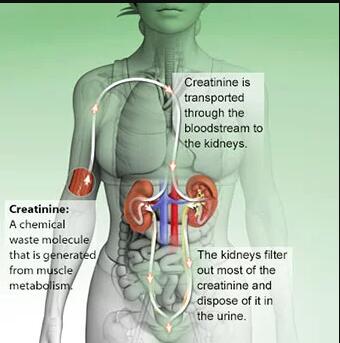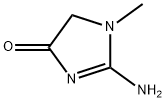Biological Significance of Creatinine
Oct 8,2019
Introduction of Creatinine
Creatinine is a chemical waste product of creatine phosphate metabolism by skeletal muscle tissue as part of normal daily activity. It is a non-protein made by the body and is used to supply energy mainly to muscles. Creatinine production is continuous in a steady rate and is proportional to muscle mass [1]. The bloodstream carries creatinine to the kidneys, which filter it out of the blood and then creatinine passes out of the body in the urine [2].
Biological or Clinical Significance
Creatinine is freely filtered and therefore the serum creatinine level depends on the Glomerular Filtration Rate (GFR). Another substance, creatine, is formed when food is changed into energy in the body through a metabolism process [3]. Creatinine and creatinine clearance tests measure the level of the waste product creatinine in the blood and urine. The determination of the creatinine clearance is a valuable parameter as a measure of the glomerular filtration of the kidney because creatinine is not excreted or reabsorbed by the tubules. Measuring the creatinine clearance rate obviates some of the problems of using serum creatinine concentration as a marker of GFR. Creatinine clearance should not be affected by differences in steady-state creatinine production due to differences in muscle mass that affect serum creatinine level [4].
Acute kidney injury (AKI) is a common and devastating medical condition, but no widely accepted definition exists. The diagnosis of acute kidney injury, previously termed acute renal failure, is based typically on an elevation in the serum creatinine concentration. There is still no broadly accepted consensus on the degree of serum creatinine elevation required to qualify for the diagnosis of AKI. A recent classification system by the Acute Dialysis Quality Initiative (RIFLE) defines AKI largely by percentage increases in serum creatinine over baseline. However, two recent and highly publicized consensus definitions/classification systems have been proposed that severity and duration of oliguria were incorporated as alternative criteria [5].
Potential relationships between disturbances in creatine metabolism and diseases of skeletal muscle, heart, brain, and kidney were reported. Although some of the relationships may be accidental, it is nevertheless striking that a close correlation between the functional capacity of the creatine kinase/phosphorylcreatine/creatine system, tissue integrity, and metabolic capacity was observed. Potentially, creatine supplementation may become a versatile therapeutic tool for treating such related diseases. Cr supplementation was shown to be of benefit to patients suffering from gyrate atrophy of the choroid and retina, mitochondrial cytopathies and other neuromuscular diseases [6].
Diabetic nephropathy affects 30% of all diabetics and it is a leading cause of end stage renal disease. Clinically, diabetic nephropathy is evidenced by proteinuria, decline in glomerular function rate (GFR), hypertension, and has high risk of cardiovascular morbidity and mortality. In diabetic nephropathy, serum urea and creatinine are known to be raised with hyperglycemia in uncontrolled diabetics and usually correlate with severity of kidney damage. Measurement of serum urea and creatinine are easily available tests to assist detection and prevention diabetic kidney disease at an early stage and can limit the progression to end stage renal disease. Blood urea and serum creatinine levels are simple tests helpful in diabetics who are poorly controlled to assess the renal function [7].
References
[1] https://www.bioagilytix.com/biomarkers/creatinine-enzymatic/
[2] https://kidshealth.org/AetnaBetterHealthVirginia/en/parents/test-creatinine.html
[3] https://www.uofmhealth.org/health-library/hw4322
[4] Chapter 2 - Laboratory Assessment of Kidney Disease, in: M.R. Clarkson, C.N. Magee, B.M. Brenner (Eds.), Pocket Companion to Brenner and Rector's The Kidney (Eighth Edition), W.B. Saunders, Philadelphia, 2011, pp. 21-41.
[5] S.S. Waikar, J.V. Bonventre, Creatinine kinetics and the definition of acute kidney injury, Journal of the American Society of Nephrology, 20(2009) 672-9.
[6] M. Wyss, R. Kaddurah-Daouk, Creatine and creatinine metabolism, Physiological reviews, 80(2000) 1107-213.
[7] S. Bamanikar, A. Bamanikar, A. Arora, Study of Serum urea and Creatinine in Diabetic and non-diabetic patients in in a tertiary teaching hospital, The Journal of Medical Research, 2(2016) 12-5.
- Related articles
- Related Qustion
- Diagnostic use of Creatinine Jul 14, 2022
Creatinine is a chemical waste product in the blood that passes through the kidneys to be filtered and eliminated in urine. The chemical waste is a by-product of normal muscle function.
- Causes of abnormal creatinine levels and symptoms Oct 8, 2019
A high level of creatinine is not a direct cause of symptoms, and patients with above-normal levels of creatinine may notice no change. Symptoms associated with high creatinine are most often caused by an underlying illness that affects kid
Agar, is also called Kanten, Japenese gelatine, or China grass, is a jelly-like substance derived from seaweed species of the genera Gelidium. It is consisted of polysaccharides agarose and agaropectin.....
Oct 8,2019Food AdditivesA high level of creatinine is not a direct cause of symptoms, and patients with above-normal levels of creatinine may notice no change. Symptoms associated with high creatinine are most often caused by an underlying illness that affects kid....
Oct 8,2019Biochemical EngineeringCreatinine
60-27-5You may like
- The benefits of Copper tripeptide
Apr 22, 2024
- Triphosphopyridine nucleotide: Introduction and Uses
Apr 18, 2024
- Is arbutin safe to use every day?
Apr 18, 2024
- Creatinine
-
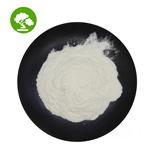
- $0.00/ KG
- 2024-04-12
- CAS:60-27-5
- Min. Order: 1KG
- Purity: 99%
- Supply Ability: 50000 Kg/Month
- Creatinine
-
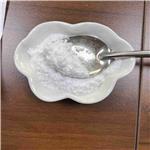
- $100.00 / 1bag
- 2023-08-31
- CAS:60-27-5
- Min. Order: 1bag
- Purity: 99
- Supply Ability: 5000
- Creatinine
-
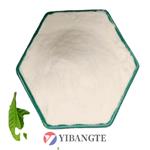
- $0.00 / 1kg
- 2023-08-18
- CAS:60-27-5
- Min. Order: 1kg
- Purity: 0.99
- Supply Ability: 50000kg




